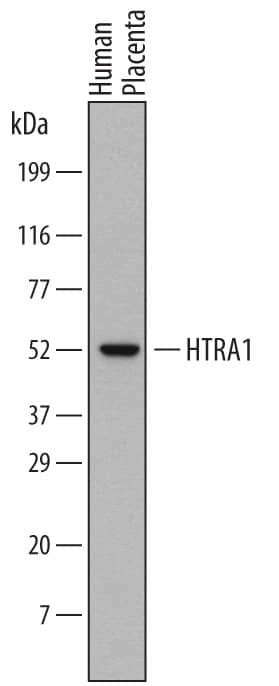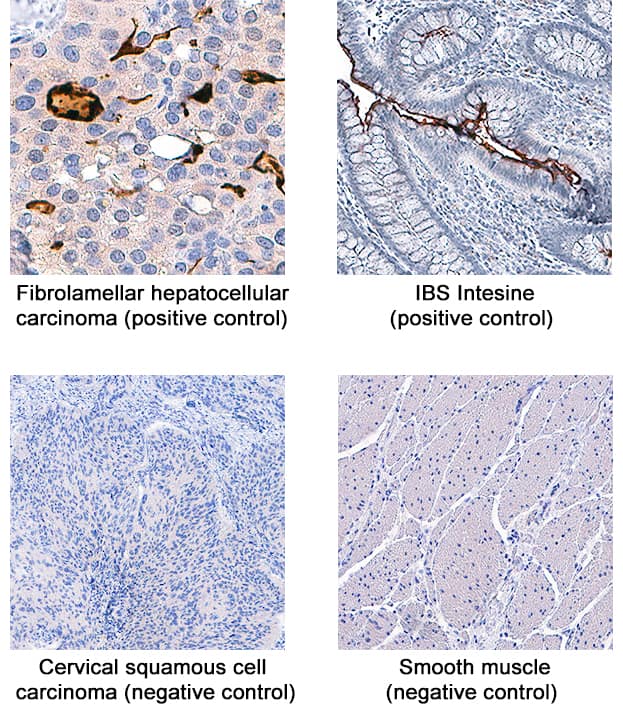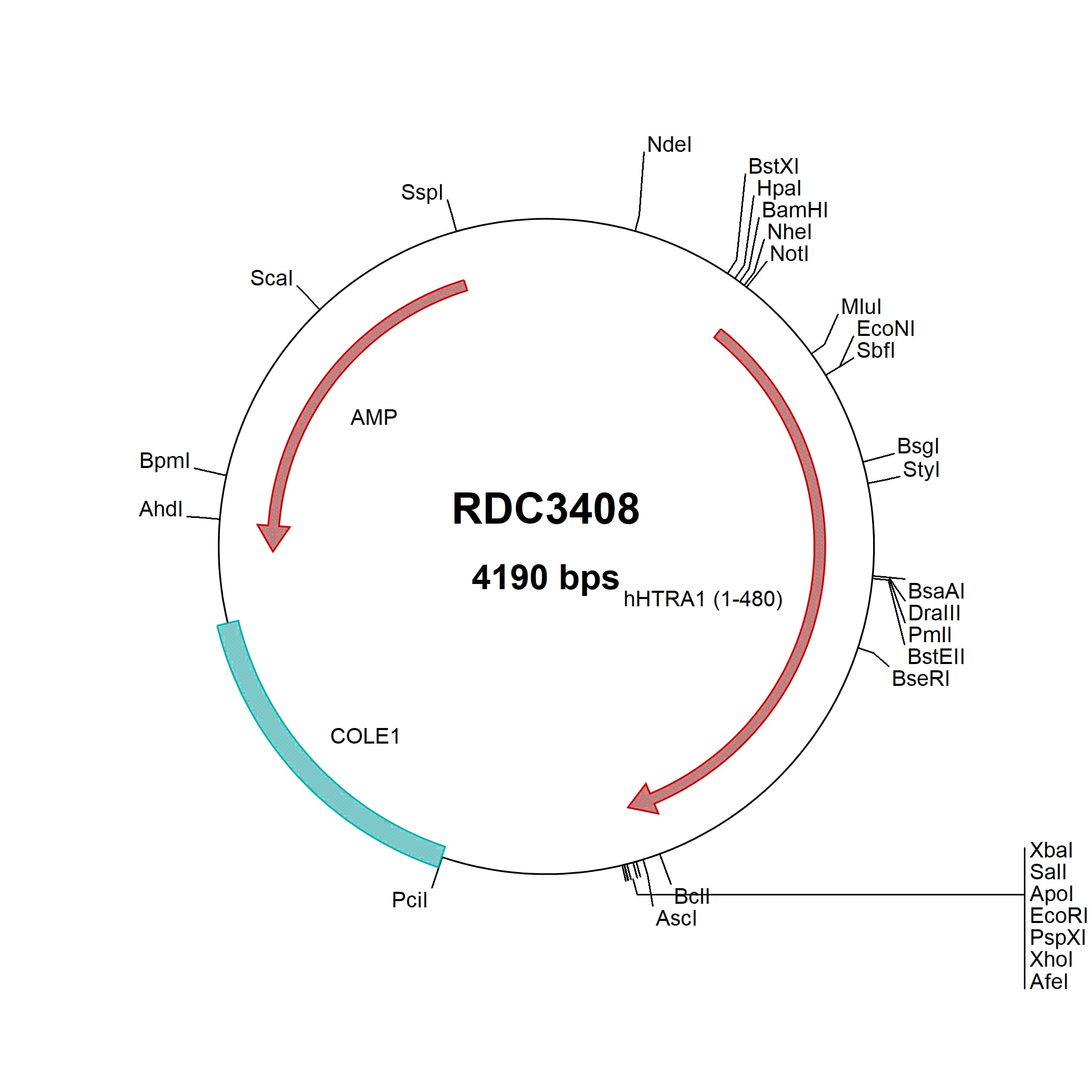HTRA1/PRSS11 Products
First discovered in E.coli, HTRA null mutants had two phenotypes. They either did not grow at elevated temperatures (HTRA for High Temperature Requirement) or failed to digest misfolded proteins in the periplasm (DegP). Subsequently, prokaryotic HTRA has been attributed to the tolerance against various folding stresses and to pathogenicity. Human homologs (HTRA1 to 4) are believed to play a role in arthritis, cell growth, unfolded stress response, apoptosis, aging and tumor progression.
102 results for "HTRA1/PRSS11" in Products
102 results for "HTRA1/PRSS11" in Products
HTRA1/PRSS11 Products
First discovered in E.coli, HTRA null mutants had two phenotypes. They either did not grow at elevated temperatures (HTRA for High Temperature Requirement) or failed to digest misfolded proteins in the periplasm (DegP). Subsequently, prokaryotic HTRA has been attributed to the tolerance against various folding stresses and to pathogenicity. Human homologs (HTRA1 to 4) are believed to play a role in arthritis, cell growth, unfolded stress response, apoptosis, aging and tumor progression.
| Reactivity: | Human |
| Details: | Mouse IgG2b Monoclonal Clone #275615 |
| Applications: | WB, IP |
| Reactivity: | Human, Mouse, Rat, Canine, Bovine, +1 More |
| Details: | Rabbit IgG Polyclonal |
| Applications: | WB, ICC/IF, Simple Western |
| Reactivity: | Human |
| Details: | Mouse IgG2a Monoclonal Clone #275603 |
| Applications: | IHC |
| Reactivity: | Human |
| Details: | Mouse IgG2b Monoclonal Clone #275615 |
| Applications: | WB, IP |
| Reactivity: | Human |
| Details: | Mouse IgG2a Monoclonal Clone #275603 |
| Applications: | IHC |
| Reactivity: | Human |
| Details: | Mouse IgG2b Monoclonal Clone #275615 |
| Applications: | WB, IP |
| Reactivity: | Human |
| Details: | Mouse IgG2a Monoclonal Clone #275603 |
| Applications: | IHC |
| Reactivity: | Human |
| Details: | Mouse IgG2a Monoclonal Clone #275603 |
| Applications: | IHC |
| Reactivity: | Human |
| Details: | Mouse IgG2a Monoclonal Clone #275603 |
| Applications: | IHC |
| Reactivity: | Human |
| Details: | Mouse IgG2a Monoclonal Clone #275603 |
| Applications: | IHC |
| Reactivity: | Human |
| Details: | Mouse IgG2b Monoclonal Clone #275615 |
| Applications: | WB, IP |
| Reactivity: | Human |
| Details: | Mouse IgG2b Monoclonal Clone #275615 |
| Applications: | WB, IP |
| Reactivity: | Human |
| Details: | Mouse IgG2b Monoclonal Clone #275615 |
| Applications: | WB, IP |
| Reactivity: | Human |
| Details: | Mouse IgG2a Monoclonal Clone #275603 |
| Applications: | IHC |
| Reactivity: | Human |
| Details: | Mouse IgG2b Monoclonal Clone #275615 |
| Applications: | WB, IP |
| Reactivity: | Human |
| Details: | Mouse IgG2a Monoclonal Clone #275603 |
| Applications: | IHC |
| Reactivity: | Human |
| Details: | Mouse IgG2b Monoclonal Clone #275615 |
| Applications: | WB, IP |
| Reactivity: | Human |
| Details: | Mouse IgG2b Monoclonal Clone #275615 |
| Applications: | WB, IP |
| Reactivity: | Human |
| Details: | Mouse IgG2a Monoclonal Clone #275603 |
| Applications: | IHC |
| Reactivity: | Human |
| Details: | Rabbit IgG Polyclonal |
| Applications: | ICC/IF, Simple Western |
Recombinant Monoclonal Antibody
| Reactivity: | Human |
| Details: | Rabbit IgG Monoclonal Clone #SR4329 |
| Applications: | WB, ICC/IF |
| Applications: | ELISA |
| Applications: | WB |



![Western Blot: HTRA1/PRSS11 Antibody [NBP2-23869] Western Blot: HTRA1/PRSS11 Antibody [NBP2-23869]](https://resources.bio-techne.com/images/products/HTRA1-PRSS11-Antibody-Western-Blot-NBP2-23869-img0003.jpg)


![Immunocytochemistry/ Immunofluorescence: HTRA1/PRSS11 Antibody [NBP1-81654] Immunocytochemistry/ Immunofluorescence: HTRA1/PRSS11 Antibody [NBP1-81654]](https://resources.bio-techne.com/images/products/HTRA1-PRSS11-Antibody-Immunocytochemistry-Immunofluorescence-NBP1-81654-img0008.jpg)
![Western Blot: HTRA1/PRSS11 Antibody (SR4329) [NBP3-27848] -](https://resources.bio-techne.com/images/products/nbp3-27848_rabbit-htra1-prss11-mab-sr4329-75202410133458.jpg)
![ELISA: Human HTRA1/PRSS11 ELISA Kit (Colorimetric) [NBP2-76585] - Human HTRA1/PRSS11 ELISA Kit (Colorimetric)](https://resources.bio-techne.com/images/products/nbp2-76585_human-htra1-prss11-elisa-kit-colorimetric-132202416225263.jpg)
![Western Blot: HTRA1/PRSS11 Overexpression Lysate [NBL1-11785] Western Blot: HTRA1/PRSS11 Overexpression Lysate [NBL1-11785]](https://resources.bio-techne.com/images/products/htrA1-Overexpression-Lysate-Adult-Normal-Western-Blot-NBL1-11785-img0002.jpg)